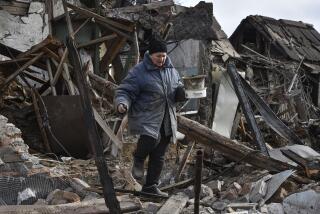Trying diplomacy in Syria
When President Obama asked Congress to authorize a military attack against Syria, he said the goal was to “hold the Assad regime accountable for their use of chemical weapons, deter this kind of behavior and degrade their capacity to carry it out.”
Can the same objectives be accomplished through diplomacy? In his address to the nation Tuesday, Obama announced that he would pursue that possibility, even as he reserved the option of military action. That was the right call, but the diplomatic track must not be allowed to become a long and winding road to nowhere.
What’s under discussion is a Russian proposal for “international control” of Syria’s chemical weapons and their “subsequent destruction.” It was broached by Russian Foreign Minister Sergei Lavrov after Secretary of State John F. Kerry suggested that Assad might avert U.S. military action by turning over “every single bit of his chemical weapons to the international community in the next week.” Kerry added: “But he isn’t about to do it, and it can’t be done, obviously.” Then Syrian officials endorsed the idea and even suggested Syria would sign the Chemical Weapons Convention.
An agreement that would truly put Syria’s chemical weapons “beyond use” would be a preferable alternative to military action. It would reaffirm the international condemnation of chemical warfare and might prove just as successful as airstrikes in preventing future atrocities by the Assad government. It might even have a deterrent effect on other nations considering the use of nonconventional weapons.
But will it work? Kerry has said that the United States seeks a “full resolution” of the U.N. Security Council, an apparent reference to a so-called Chapter 7 resolution that would authorize member states to use military force to implement it. So far Russia, which has veto power on the council, has resisted that approach. Even if the council were to approve a muscular resolution, Assad’s past mendacity in dealings with U.N. representatives raises concerns that he would obstruct weapons inspectors — who would be performing their duties in the midst of a civil war.
Their jobs would not be easy. Monitors would need some measure of protection from the wars violence, and the process of identifying and destroying the weapons would have to be verifiable. There would also have to be serious consequences for noncompliance so that the process wouldn’t become a farce or a cat-and-mouse game reminiscent of the long effort to inspect Saddam Hussein’s supposed weapons of mass destruction.
Notwithstanding these concerns, Obama’s decision to explore a diplomatic solution is a prudent one. We continue to believe that the use of chemical weapons against civilians requires a response from this country, ideally in concert with other nations. But, like the president, we hope that message can be effectively delivered other than by military might.
More to Read
A cure for the common opinion
Get thought-provoking perspectives with our weekly newsletter.
You may occasionally receive promotional content from the Los Angeles Times.










